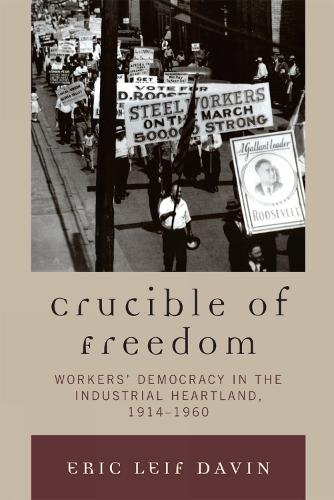
Crucible of Freedom: Workers' Democracy in the Industrial Heartland, 19141960
(Paperback)
Publishing Details
Crucible of Freedom: Workers' Democracy in the Industrial Heartland, 19141960
By (Author) Eric Leif Davin
Bloomsbury Publishing PLC
Lexington Books
23rd November 2011
United States
Classifications
Professional and Scholarly
Non Fiction
History of the Americas
Social classes
Sociology
Urban communities / city life
331.09730904
Physical Properties
Paperback
464
Width 154mm, Height 231mm, Spine 32mm
680g
Description
This book explores the relation between democracy and industrialization in United States history. Over the course of the 1930s, the political center almost disappeared as the Democratic New Deal became the litmus test of class, with blue collar workers providing its bedrock of support while white collar workers and those in the upper-income levels opposed it. By 1948 the class cleavage in American politics was as pronounced as in many of the Western European countries-such as France, Italy, Germany, or Britain-with which we usually associate class politics.
Working people created a new America in the 1930s and 1940s which was a fundamental departure from the feudalistic and hierarchical America that existed before. They won the political rights of American citizenship which had been previously denied them. They democratized labor-capital relations and gained more economic security than they had ever known. They obtained more economic opportunity for them and their children than they had ever known and they created a respect for ethnic workers, which had not previously existed. In the process, class politics re-defined the political agenda of America as-for the first time in American history-the political universe polarized along class lines. Eric Leif Davin explores the meaning of the New Deal political mobilization by ordinary people by examining the changes it brought to the local, county, and state levels in Pittsburgh, Allegheny County, and Pennsylvania as a whole.
Reviews
Based on extensive scholarship and archival evidence, this excellent study examines 'how and why common working people mobilized in the 1930s to create a more egalitarian America.' Davin (Univ. of Pittsburgh) revises the 'failure' of the New Deal by arguing that its limitations and successes should be attributed to the ethnic working class who created it. In Pittsburgh and surrounding towns in the heartland, readers come to know ordinary people's 'hearts and minds' and potent class-consciousness through an impressive use of oral histories. When they demanded respect and to be counted as citizens, they achieved a 'workers' democracy,' political equality, material gains, and opportunity for economic advancement. The region's political arena is interwoven with events and trends occurring in the state and nation to help readers understand the modern liberal order's founding. For the 1940s and 1950s, Davin challenges the designations of business unionism, corporate liberalism, the 'barren marriage' of the Democratic party and the labor movement, and labor's own anti-communism, with consistent attention paid to the grassroots. Necessary for 20th-century US history collections; essential for labor and political history. Summing Up: Highly recommended. * Choice Reviews *
Based on a 1999 dissertation completed at the University of Pittsburgh, this book is the product of the authors decades-long engagement with the working-class history of western Pennsylvania. Gathered over those many years, Davins research is astonishing . . . for its depth of detail. His mastery of ward level politics in Pittsburgh and the surrounding steel towns is unquestionable. So too is his grasp of the importance that religion played in the lives and politics of Pennsylvania workers. . . .Readers need not accept all of Davins characterizations and judgments to recognize his book as a remarkable and formidable work of history. This is a book to be read and reckoned with by anyone who seeks to understand the nature of the political transformation that swept across industrial America during the Great Depression and World War II. Eric Leif Davin deserves our gratitude for having created such a vivid portrait of what E. P. Thompson might have called Steel Valleys 'working-class presence' at a moment when workers helped reshape the direction of both their regions and their nations politics. * LABOR: Studies in Working-Class History of the Americas *
This book makes a major contribution to the understanding of labor history in the United States. Focusing on steelworkers in Pittsburgh between 1914 and 1960, Eric Leif Davin has much to say that will strike chords among New Deal labor historians. Davin makes a strong case for the salience of class and class consciousness for understanding the transformation of labor relations and politics during the New Deal era, and he does a good job placing this regional study within a broader national framework. His work speaks to all historians interested in the twentieth-century United States. Davin has crafted an important account of working-class agency in the New Deal era that reminds us of what was truly radical and empowering about that period. -- Thomas Dublin * Journal of American History *
Eric Davin's meticulous examination of sources, especially his use of contemporary material, as well as his linking of seemingly disparate trends, makes Crucible of Freedom a must read, not only for those who wish to understand the New Deal in the 1930s in the United States, but also the nature of American society today. -- Michael Goldfield, Professor of Industrial Relations and Human Resources, Wayne State University, and author of Labour, Globalization, and the Stat
Author Bio
Eric Leif Davin is professor of history at the University of Pittsburgh, winner of the Eugene V. Debs Foundation's Bryant Spann Memorial Prize in Literature for his historical writing, and author of Partners in Wonder: Women and the Birth of Science Fiction, 1926-1965.
